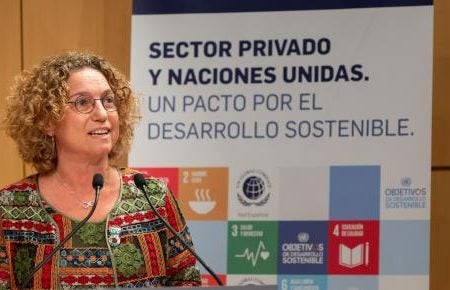ARPA CEO Elected President of Spanish Global Compact Network

Clara Arpa, CEO of Arpa EMC, has recently been elected president of the Spanish Global Compact Network, whose objective is to promote the implementation of the Ten Principles of the Global Compact for business sustainability and work on the Sustainable Development Goals (SDG) at the corporate level.
A line of action of which she is firmly convinced and that she began to develop in the company- a company dedicated to the design, manufacture and deployment of field logistic solutions for the defense sectors , health and emergencies – with a strategic plan that led to reviewing all production processes, implementing a LEAN manufacturing system, working on an equality plan and influencing training, among other pillars.
A commitment in which she will continue working from the Spanish Network in which she replaces Ángel Pes in the presidency, with the aim of continuing to maintain its leadership at the international level and increase the number of signatory companies. In addition, the president of the Spanish Network of the Global Compact refers to the publication “SDG Year 5, Collective leadership in the 2030 Agenda: a decade for action” that analyzes the degree of knowledge and implementation of the 2030 Agenda in the areas of the organizations and highlights the need to promote collective leadership to achieve the Sustainable Development Goals.
Likewise, another of the challenges that I have set for myself is promoting collective business leadership?
Spanish companies must empower themselves and transfer their leadership in sustainability within all their departments and to all their stakeholders. For this reason, from here I appeal to all companies to join us. The Spanish Network is the most powerful and numerous local network of the United Nations Global Compact that wants to achieve a transformative movement of companies.
Why is sustainability so important in the current business environment in Spain?
If we have learned anything from this complex and extreme situation that we are living, it is that sustainability is the insurance of survival for the planet, humanity and, of course, companies.
The great challenges of the world such as climate change or inequalities between countries, and now the pandemic derived from Covid-19, have shown that the future will be sustainable or it will not be. Therefore, companies that adopt a sustainable vision in their business strategies will be able to survive in the long term, while those that remain in what we usually call “business as usual” will be left behind and will not be able to adapt to the new challenges of the world. Now is the time to transform under a new paradigm, a sustainable paradigm that fits the framework of the 2030 Agenda, which is why it is the Humanity Agenda. Rebuilding models that do not work would be unthinkable.
What role do companies play in this change?
Companies play a fundamental role due to their immense transforming power not only of the economy, but also of society, over the ways of producing, consuming, training, communicating, etc. We must bear in mind that companies are made up of people who are part of society, relate to their environment and consume, with the consequent impact that their habits entail. In this Decade of Action for the SDGs, the business sector has to take another step, it is no longer enough just to integrate the 2030 Agenda into the company’s strategy, now it must be sown in each of the people who make it up. It is what we call promoting “collective leadership.”
To become aware of the importance of this aspect, it is enough to stop and reflect for a second on the data: only in Spain there are around 2,860,755 companies that employ 15,532,951 people, which represents around a third of the total population of the country. If the nearly 3 million companies invested in more sustainable models and their employees committed to the SDGs, then we would get the momentum we need to accelerate the achievement of the 2030 Agenda and rebuild towards a better and more resilient world.
Do you perceive a greater sensitivity in companies for sustainability in this time of pandemic?
All the recovery policies proposed, especially at European level, are based on the green economy, social protection, the new social framework, etc. Undoubtedly a clear sign that sustainability is one of the fundamental ways to recover, not only economically, but at all levels.
And, as we have stated on numerous occasions, sustainability holds great opportunities, such as the fact that the SDGs can add 12 trillion dollars to world GDP by 2030, which positions them as a strategic area in which to invest in this moment.
In fact, if we base ourselves on the evolution of sustainability indices, those companies that have shown a greater commitment to social and environmental aspects have been rewarded in the markets and this implies the activation of the economy. For example, according to the MSCI ACWI Sustainable Impact index, which includes companies whose income depends mainly on sustainability solutions, they have tripled in profitability on the global stock market.
That is why, at this inflection point in which we find ourselves, sustainability has become an area with immense potential to revive the economy. As we have seen, it offers us economic and employment opportunities, long-term stability, it offers us a future.
How will companies integrate the SDGs of the United Nations 2030 Agenda in their different departments?
It is of paramount importance that companies integrate the SDGs in each and every one of their areas. They should not be limited only to the sustainability department, since all business activity has an impact on the 2030 Agenda. We must not forget that we are talking about a transversal framework that must be placed at the center of the company’s strategy with the objective to start the road to a better recovery.
Just a few days ago we presented our publication “SDG Year 5, Collective leadership in the 2030 Agenda: a decade for action” which, precisely, analyzes the degree of knowledge and implementation of the 2030 Agenda in the most significant areas of organizations and, in addition, it highlights the need to promote collective leadership to achieve the Sustainable Development Goals (SDG). Among other issues, and based on a survey on the integration of the SDGs to 411 directors of 161 entities adhered to the Global Compact, which belong to 13 departmental areas, the publication highlights that they are mainly the areas of sustainability and the environment, with 92% and 70%, respectively, those that integrate the SDGs within the department’s strategy. On the other hand, the financial, purchasing and regulatory compliance departments barely include the 2030 Agenda framework within their strategy, around 33%.
These data show that, although considerable progress has been made in contributing to the SDGs, there is still considerable room for improvement. And, now more than ever, we need the business sector to lead the transformation towards more equitable, responsible, sustainable and resilient systems.


